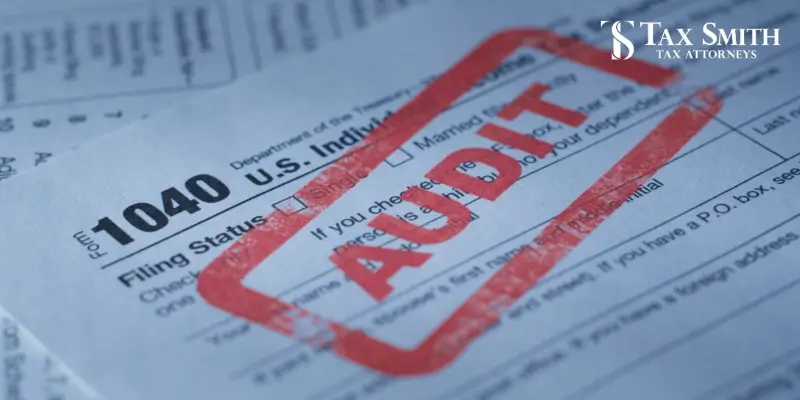1548 The Greens Way – Ste. 4 Jacksonville Beach FL 32250
Ponte Vedra IRS Tactics Attorney
Ponte Vedra IRS Tactics Lawyer
For many taxpayers, the IRS (Internal Revenue Service) is an intimidating agency. Taxpayers can face penalties and other consequences for late payments and unfiled tax returns, which can be incredibly stressful. More serious penalties are used when people or businesses commit tax fraud or tax evasion. If you have tax debt, are expecting an audit, or are facing IRS tactics for payment recovery, you need to work with a qualified Ponte Vedra IRS tactics attorney.
Understanding the different tactics the IRS uses to recover the taxes they are owed is useful to understanding the impact this agency can have on your life. Although it may be tempting to ignore back taxes because dealing with the agency is stressful, this has significant consequences. The IRS can impact your access to bank accounts, take from your income, and affect your properties. It is important to figure out your options in Ponte Vedra, FL, for back tax repayment before these extreme measures are taken. If you’re unsure how to navigate these challenges, a top-rated IRS tax attorney in Ponte Vedra can help you develop a strategy to protect your assets and work toward a resolution.

Tax Smith Tax Attorneys: Your Ponte Vedra IRS Tactics Law Firm
At Tax Smith Tax Attorneys, we have worked for collective decades in tax law and with the IRS. We focus only on tax laws and work hard to help our clients understand the complex and often frustrating legal issues surrounding tax debt, IRS audits, and other important tax matters. We have managed every type of IRS tactic for obtaining late taxes and know effective methods for limiting, settling, or negotiating your tax debt.
Our law firm understands how overwhelming it can be to see your financial accounts or source of income impacted. Our team helps guide you through these issues, navigate audits, and find creative solutions to tax problems.
Common Tactics Used by the IRS in Ponte Vedra
The IRS has many options for securing late payments and back taxes from individuals and businesses who miss payments or fail to pay taxes. Audits and other investigatory tools are used to discover and punish tax evasion or tax fraud. All the IRS’s tools exist to protect their bottom line and ensure that they are paid the taxes they are owed.
For most taxpayers, the IRS will first provide notices and other forms of contact regarding late payments. If a taxpayer does not respond, makes no attempt to remedy the amount, or does not attempt to negotiate alternate payments, the IRS may take several actions, including:
- Wage Garnishment Wage garnishment, or wage levy, occurs when the IRS takes the tax payments they are owed directly from a taxpayer’s paycheck. The IRS will contact the taxpayer’s employer and tell them to take a certain percentage out of a person’s wages. This cannot exceed 25% of the wages each pay period. The IRS can also garnish other forms of income, such as Social Security or pension payments, although these may have additional percentage restrictions.The IRS only garnishes a person’s wages if the taxpayer has refused to negotiate a payment plan or respond to the IRS’s attempts to contact them. The taxpayer will receive several notifications regarding this action.
- Tax Lien A tax lien is placed on an asset, like a taxpayer’s home or other property. This tactic is typically only used if other methods to obtain payments have been unsuccessful and the taxpayer has ignored attempts to secure payments. A tax lien on property means that it is collateral if the taxes are not paid, so the IRS knows they will eventually obtain that value. This is typically used as a scare tactic to get a taxpayer to respond and plan out how to make payments.
- Bank Levy A bank levy prevents a taxpayer from accessing a bank account, and the IRS can then remove funds from the account to cover tax payments. The IRS will provide warnings of this tactic, giving a taxpayer time to find alternate methods of repayment. If the levy does not satisfy the tax debt, there may be additional levies placed on other accounts.

Ponte Vedra,FL, IRS Tactics FAQs
Do I Need a Lawyer for an IRS Audit?
An IRS audit may occur randomly or because of a mistake or discrepancy on your tax documents. Whatever the cause of the audit, you can benefit from having an attorney by your side throughout the process. An attorney can help protect your rights and look out for your interests. Even if there is no wrongdoing that causes the audit, the IRS agent is still prioritizing the interests of the agency. An attorney can also help negotiate if evidence of discrepancies is found.
Why Do People Hire Lawyers When Dealing With the IRS?
An attorney can help people prepare for meetings and audits with the IRS, protecting their rights during the process. If a person or business has a significant tax debt, a tax lawyer can determine the options available to their client to limit or eliminate the debt by erasing penalties, negotiating a payment plan, or creating an offer in compromise. If a person or business has a tax law dispute, an attorney can help them determine how to effectively handle it while protecting their assets.
Has Anyone Won a Legal Claim Against the IRS?
Yes, individuals have won legal claims against the IRS. However, there are very specific circumstances in which you can file against the IRS, such as if the IRS has miscalculated your tax payments or has violated your rights. This may include the right to appeal or the right to privacy. If you believe you have a case against the IRS, it is important that you talk with an experienced tax attorney. They can review your situation to determine if you have a viable case. A lawyer can also represent your interests in court.
Does the IRS Recognize Power of Attorney?
Yes, you can authorize another person to represent your interests with the IRS for federal tax issues. This is providing that person with the power of attorney. This person may be a tax lawyer, a family member, a friend, an accountant, or another professional. An authorized power of attorney is allowed to represent you, advocate for you, and negotiate on your behalf. There are also other types of third-party authorizations that the IRS allows, such as tax information authorization, third-party designee, and oral disclosure.
Protecting Your Interests With a Tax Attorney
At Tax Smith Tax Attorneys, we want to help you find the optimal solution for your tax problems. Whether you are facing an IRS audit or IRS tactics for securing back taxes, contact our team to see how we can help.
Locations We Serve
- Alabama
- Arizona
- California
- Colorado
- Connecticut
- Delaware
- District of Columbia
- Florida – HQ
- Georgia
- Idaho
- Illinois
- Indiana
REQUEST A CONSULTATION
Please fill out the Contact Request Form and a Tax Attorney/Paralegal will call you
to discuss legal representation or to schedule your free initial consultation





